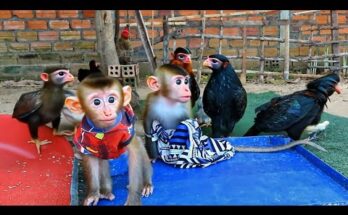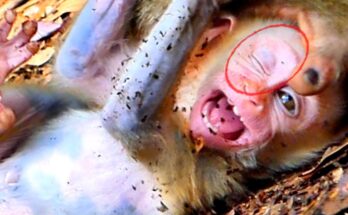
Mato’s calls intensified, a mixture of frustration and relief. As his mother reached him, she gently lifted him into her arms, holding him close against her chest. Immediately, his body relaxed, and the tense energy of his moodiness began to dissipate. The warmth of her embrace, the gentle grooming motions, and the soft murmurs of comfort were all he needed.
For a young monkey like Mato, these moments of maternal reassurance are vital. They teach him that while frustration, fear, and sadness are natural, there is always a safe place to turn. His mother’s patient response to his moodiness also reinforces trust—he learns that calling for help will bring care, not anger.
After a few minutes of cuddling and soft grooming, Mato’s energy returned. He clung tightly to his mother, now calmer and more confident, ready to rejoin his siblings and continue exploring. The troop continued moving, and Mato, perched securely in his mother’s arms, watched the forest floor and nearby trees with renewed curiosity.
This incident, while brief, highlights the delicate balance between independence and dependence in young monkeys. Baby Mato’s moody moment was more than a tantrum—it was a learning experience, a chance to strengthen his bond with his mother, and a reminder of the profound impact maternal care has on emotional development in primates.
In the forest, life is full of surprises, frustrations, and lessons. For Baby Mato, lying on the ground and calling out for his mother was a simple, yet powerful moment—one that demonstrated the unwavering love and protection that defines the bond between a mother and her child.


